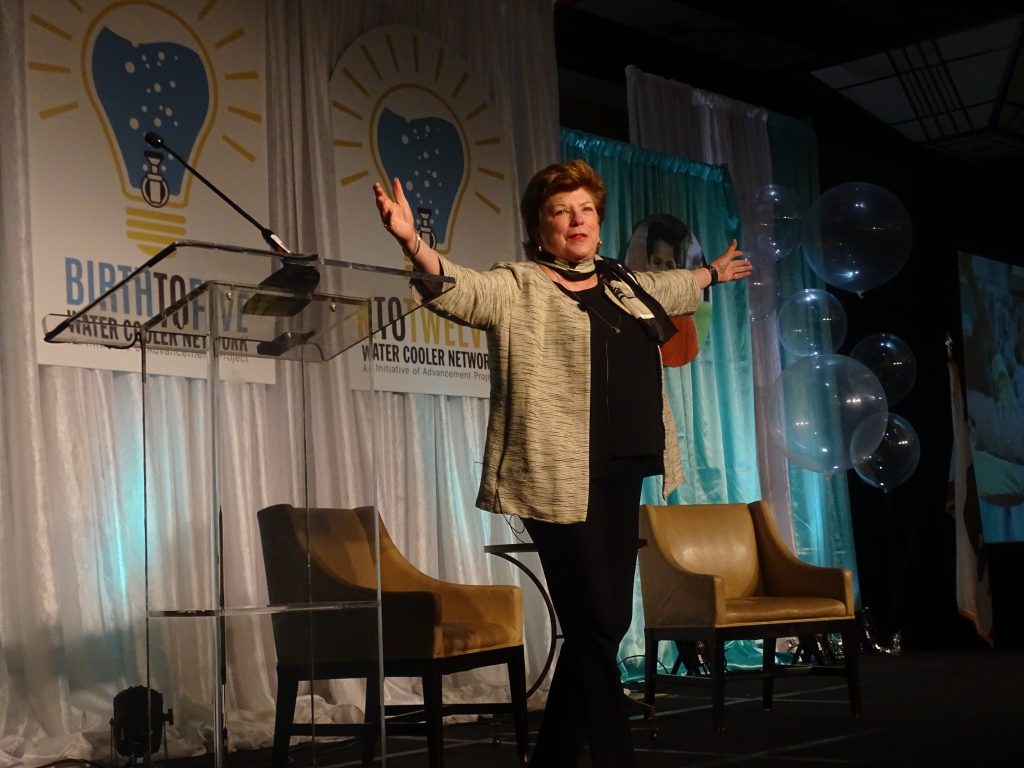
Former State Superintendent of Public Instruction Delaine Eastin.
Credit: John Joanino/Advancement Project California
Delaine Eastin, the only woman elected as California’s superintendent of public instruction, died Tuesday from complications of a stroke. She was 76.
She assumed the nonpartisan office in 1995, when the superintendent’s main power was persuasion. In a court decision preceding her election, the State Board of Education had wrested sole power to set state education policy from the state superintendent. But admirers said she used the public pulpit and verbal skills to effectively champion issues she cared about. These include raising academic standards, lowering class sizes and instilling the importance of nature in schools.
“Delaine was regarded as one of the great orators of the Legislature,” said Jack O’Connell, a fellow Democrat who served with her in the Legislature and succeeded her as state superintendent. Next to Assembly Speaker Willie Brown, Eastin was the most in demand on the speech circuit, he said. “Few could engender the kind of emotion and passion she delivered in every speech.”

Calling her “a trailblazer in public education who will forever inspire us,” current State Superintendent Tony Thurmond said Eastin “was integral in establishing standards for what students should know and be able to do,” then developing statewide assessments and a school accountability system for the results. She also strengthened the framework for financial oversight of school districts through county offices of education and a quasi-state agency, the Fiscal Crisis and Management Assistance Team.
“When I came into office, there was no testing. There were no academic content standards. And there was no system of school accountability at all,” Eastin told the San Francisco Chronicle in 2003. “And we had the largest class size in America.”
Taking advantage of the state’s financially flush years, she made smaller classes a priority and helped persuade Gov. Pete Wilson and the Legislature to invest $2.3 billion to cut the size of K-3 classes from 30 to 20 students.
In 1995, she called for a garden in every school. With the help of Berkeley restaurateur Alice Waters, she inspired the establishment of gardens in more than 3,000 schools. California became the first state to join the Clinton Team Nutrition effort to improve school nutrition. She oversaw curriculum guides on how to teach the academic content standards through nutrition, gardening, and cooking.
O’Connell called her “fearless in the constant fight for better school funding and put herself in the middle of every battle on behalf of kids.”
She was an early advocate of early childhood education, establishing a preschool task force of educators, business leaders, civil rights and children’s advocates that called for universal preschool. She established the state’s Teacher of the Year program; Thurmond honored her in this year’s state ceremony.
Sen. Dave Cortese, D-San Jose, a former school board member in San Jose, said Eastin left “an indelible imprint” on California’s school system. “Delaine was more than a colleague; she was a mentor and friend,” he said.
Born in San Diego, she moved to San Carlos as a child and was the first in the family to graduate from college, earning a bachelor’s degree from UC Davis and a master’s from UC Santa Barbara in political science. After teaching women’s studies and politics at De Anza College and Cañada College, she worked as a strategic planner for what was then Pacific Telephone before being elected to the City Council of Union City. She served four years in the Assembly in a district representing pats of Alameda and Santa Clara counties.
After serving the maximum two terms as state superintendent, she returned to politics in a brief run for governor as a voice for progressives in the 2018 Democratic primary. She was sixth with 3.4% of the vote. (For a transcript of an interview with then Executive Director Louis Freedberg during that campaign, go here.)
Eastin recalled to Orange County Register reporter Hanna Kang last year that women legislators were few and “especially close to each other” when she was in the Legislature. “Women did look after one another because we sort of had to, because we would be dismissed or spoken down to in some instances unless we stood up for each other.”
“I remember in the early days, there were people who wouldn’t let me on the members’ elevator because I was a girl, and I couldn’t possibly be a member,” she said.
Plans are underway for a public celebration to be held this summer.
